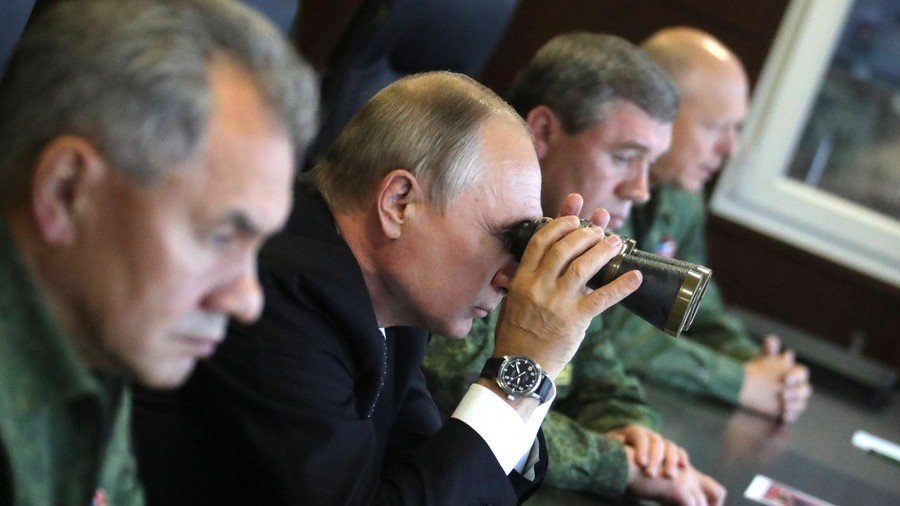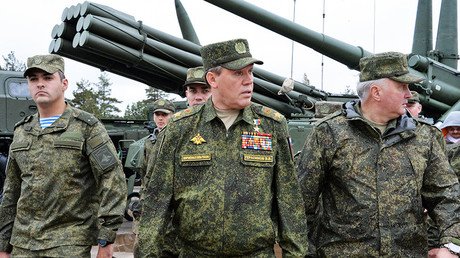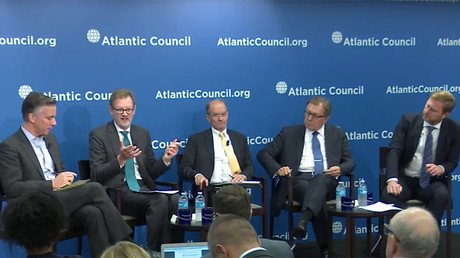‘Gerasimov doctrine’ finally put to rest? Russia ‘expert’ apologizes for coining snappy term

For years, Western ‘experts’ on Russia spoke of the ‘Gerasimov Doctrine’ as a sinister Moscow plot to use subversion to complement military force, ignoring objections from journalists who challenged its existence. Until now.
“I’m sorry for creating the Gerasimov Doctrine,” Mark Galeotti, a senior research fellow at the Institute of International Relations in Prague, wrote in an essay published Monday in Foreign Policy.
Galeotti, a Russia-watcher popular in mainstream Western circles that are eager to source all ills to Vladimir Putin and the Kremlin, says he came up with the term when he published the translation of General Valery Gerasimov’s 2013 speech on subversion and propaganda on his blog, ‘In Moscow’s Shadows.’
The translation was actually the work of Robert Coalson of Radio Free Europe/Radio Liberty, the US government-funded broadcaster “to Russia and other unfree countries,” Galeotti noted in his mea culpa. It was the summer of 2014, and fighting was raging across eastern Ukraine as the US-backed government in Kiev cracked down on post-coup dissent that it blamed on a “Russian invasion.”
There was only one problem: the “doctrine” described in the essay did not exist.
Here we have @RT_com from September 19, 2017 and @ForeignPolicy today, March 5, 2018. Nevertheless, fair play to @MarkGaleotti for finally apologising for the 'Gerasimov Doctrine.' Takes integrity to admit mistakes. https://t.co/3Qtqnxr8my & https://t.co/IrY39CMZFxpic.twitter.com/wKQaDE70xX
— Bryan MacDonald (@27khv) March 5, 2018
“To my immense chagrin, I created this term, which has since acquired a destructive life of its own, lumbering clumsily into the world to spread fear and loathing in its wake,” Galeotti wrote in the mea culpa. “Prone, as ever, to overcompensation, Western mainstream opinion swung from ignoring Gerasimov’s pronouncements to enshrining them as some kind of bleeding-edge blueprint for a new way of war.”
The 2013 speech by the Russian general, published in the Military-Industrial Courier, described the chaos caused by US-backed “color revolutions.” According to Coalson’s translation published by Galeotti, Gerasimov spoke about how “a perfectly thriving state can, in a matter of months and even days, be transformed into an arena of fierce armed conflict, become a victim of foreign intervention, and sink into a web of chaos, humanitarian catastrophe, and civil war.”
Rather than laying out some hypothetical Russian doctrine of hybrid war, as the academic quoting the translation increasingly believed, Gerasimov was actually describing the consequences of actual Western policies in places like Yugoslavia, Libya and Syria. RT columnist Bryan MacDonald pointed this out long before Galeotti made his admission.
In fact, it was James Mattis, the current US defense secretary, who penned an essay about “hybrid wars” in 2005, back when he was a lieutenant-general in the US Marine Corps. Mattis co-wrote the article with Marine Lieutenant-Colonel Frank Hoffman, and it was published in Proceedings of the US Naval Institute.
Even as he backtracked from the ‘Gerasimov Doctrine,’ Galeotti maintained that Russia was still practicing the policies described in the speech, subverting Western democracy and institutions as the only way to compete “with a larger, richer coalition of democracies” represented by NATO. President Vladimir Putin, he claimed in the Foreign Policy essay, was “largely wrong, but not entirely so” about the threat to Russia from the West, to which US actions have “inadvertently contributed.”
It seems this was Galeotti’s way of saying he only got a little hyperbolic with the title, but the rest of his “expertise” on Russia still stood. While it is not hard to sound reasonable about Russia in comparison to, say, the corner of Twitter that has gathered around Louise Mensch, Galeotti still has miles to go.
EDITOR’S NOTE: Our story raised the ire of Professor Galeotti, who took to Twitter to accuse RT of reporting his article with a combination of "misunderstanding, wilful inaccuracy and spite.” While we stand over this piece, we also believe the subject has the right to give his side of the story too.
Galeotti contends that many experts (including himself) have challenged the existence of the “Gerasimov Doctrine.” Furthermore he interprets our statement about him being popular in western circles eager to connect all ills on Putin and the Kremlin as “suggesting my constituency is just that of biased Russophobes.”
He also explains that in his original blog he did not mention his belief that Gerasimov was laying out some hypothetical Russian doctrine of hybrid war, even though he did write "Call it non-linear war (which I prefer), or hybrid war, or special war” at the very start.














